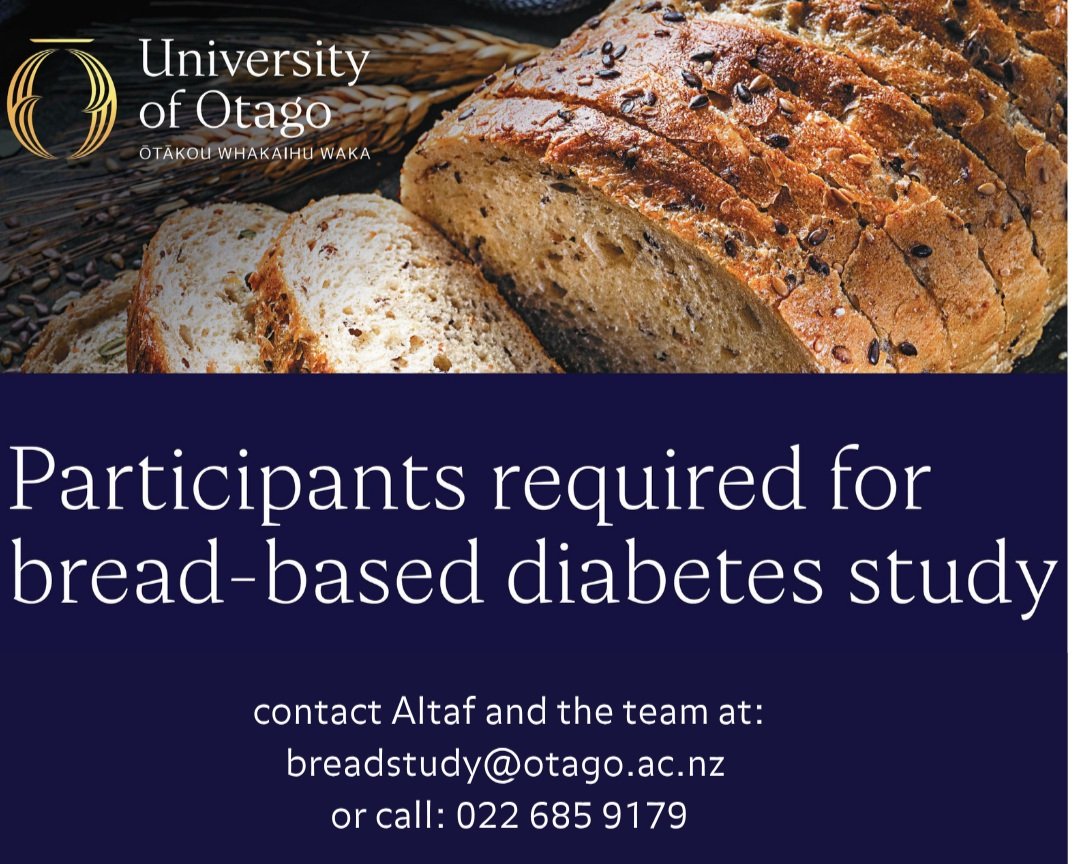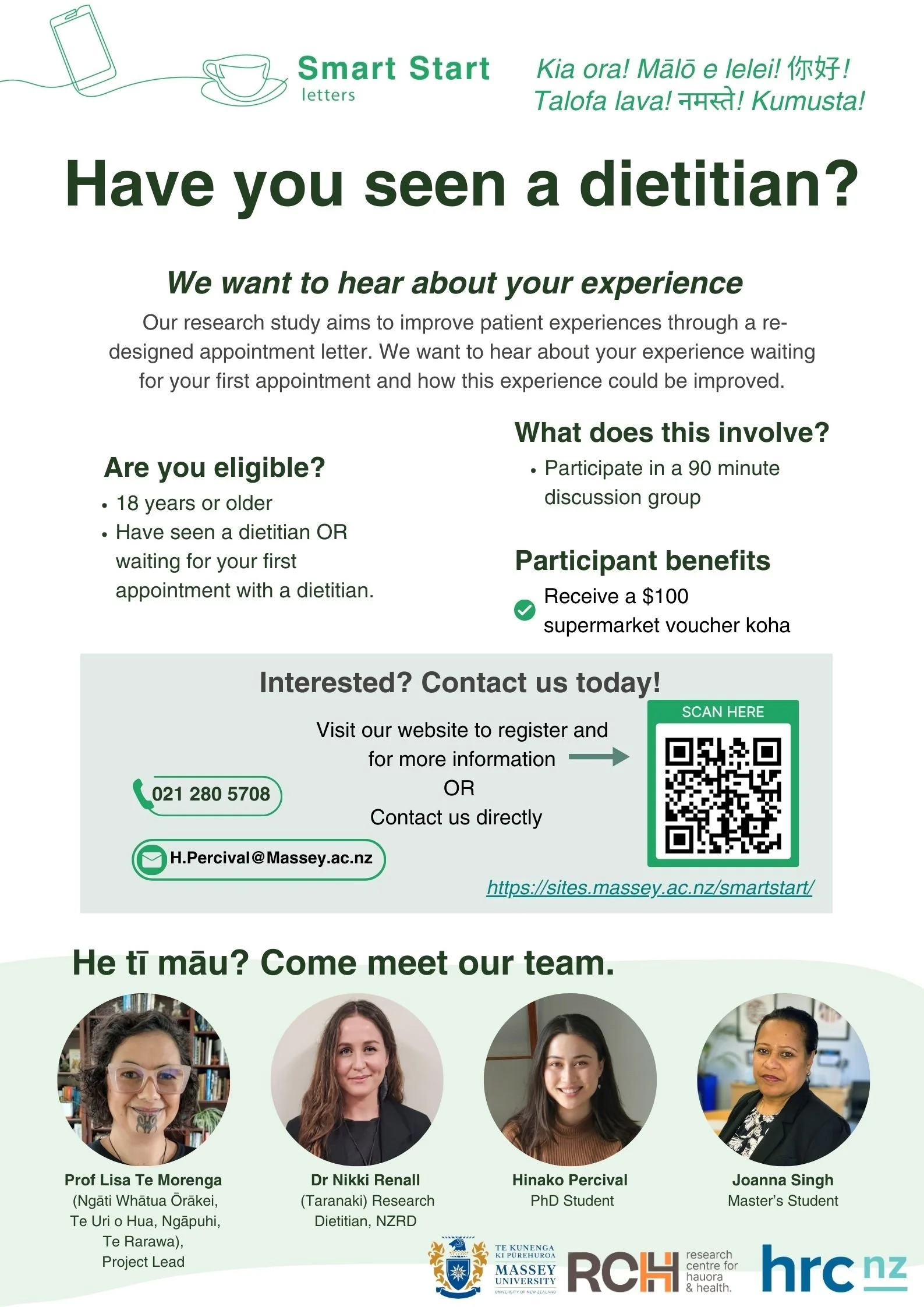Research participant opportunities
All studies and surveys that are promoted on the Diabetes New Zealand website and social media channels are provided as a service to the diabetes research community. This research is not specifically endorsed by Diabetes New Zealand.
If you would like to promote a survey or ask for participants, email info@diabetes.org.nz.
Studies currently recruiting
Bread study - Dunedin area only
A team at University of Otago are looking for people aged 18 - 80 years of age with type 2 diabetes, to take part in a study investigating the impact of increased levels of dietary fibre and protein and whether they can help with blood sugar control.
The team will replace participants’ usual bread with a different variety to try over two separate 2-week periods and then take blood and fecal (from used toilet paper) samples as well as monitoring blood sugar with a continuous glucose monitor (CGM).
Participants must also:
have stable diabetes-related medications for at least the 3 months’ prior to study entry
be able to attend 7 study appointments at Dunedin Hospital
not have coeliac disease, be pregnant or breastfeeding, or have any other condition that requires them to avoid bread
For more information, please contact Altaf and the team at: breadstudy@otago.ac.nz or call: 022 685 9179
The AID IMPACT study
Automated insulin delivery to improve outcomes for Māori and Pacific adults with type 1 diabetes and above-target glycaemia
A research team from Otago University is looking for Māori and Pacific adults with type 1 diabetes to join a 12-month research study using an automated insulin delivery system (Medtronic MiniMed™ 780G). Their goal is to improve access to this technology for Māori and Pacific Peoples and thereby aim for more equitable health outcomes. There will be face-to-face training and close ongoing support during the study.
The Medtronic MiniMed™ 780G system is used in this study, consisting of a continuous glucose monitor, an insulin pump, and an optional phone app.
If you (or a member of your whānau) are aged 16 years and older, have type 1 diabetes, have HbA1c levels above 63 mmol/mol, have not previously used an automated insulin delivery system and you would like to have a kōrero about this study, please contact:
Ōtepoti Dunedin area: Professor Ben Wheeler (ben.wheeler@otago.ac.nz) or Dr Alisa Boucsein (a.boucsein@otago.ac.nz)
Waikato area: Associate Professor Ryan Paul (Ngāti Maru – Hauraki) (ryan.paul@waikatodhb.health.nz)
Tāmaki Makaurau Auckland area: Dr Shekhar Sehgal (shekhar.sehgal@waitematadhb.govt.nz)
Have you seen a dietitian? Or are you waiting to see your dietitian? We want to hear about your experience! Please register your interest HERE
Contact: Phone 021 280 5708, Email h.percival@massey.ac.nz
For more information contact: nikki.singh@auckland.ac.nz
Note: This is open to anyone in New Zealand.
Are you over 18 and willing to share your health experiences with 2nd and 3rd year medical students to help train our future doctors?
We are currently looking for people who are willing to share their experiences with medical conditions such as diabetes. Find out more: Becoming a Friend of the Medical School Expression of Interest Form
If you have any questions please contact us on foms@otago.ac.nz or call 03 479 4859.
Please note: this is for the Dunedin/Mosgiel area.
The Impact of Diabetes in Early Adulthood: the TIDE Study
We are looking for young adults (16-25 year olds) with and without type 1 diabetes for a study on physical fitness, activity, and body composition.
Early adulthood is a challenging part of life. One can imagine that having a long-term health condition, like type 1 diabetes, while going through this stage in life is even more challenging. We are doing this study to learn about the health and fitness of young adults with type 1 diabetes compared with young adults without diabetes.
CONTACT US TO FIND OUT MORE
The University of Auckland – Department of Exercise Sciences: PHD Student Tyler Elliott tyler.elliott@auckland.ac.nz







